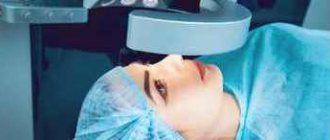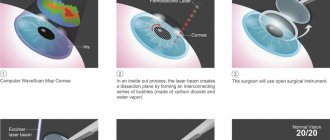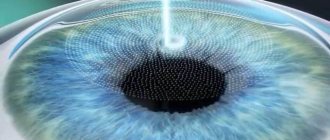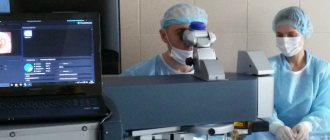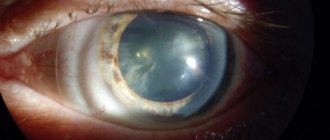How is laser vision correction performed?
Why are restrictions placed on the patient after laser vision correction? After all, it is believed that this method of correcting vision defects is the most effective and safe. Any operation is associated with risks. They do not lie in medical errors, but mainly in the actions of the patient after the operation. Often he himself becomes the culprit of complications. To understand why this happens, you should have an idea of how laser vision correction surgery works.
Today, many methods of laser restoration of visual functions are used. Each of them consists of three stages. In the first, the surgeon gains access to the inner layers of the cornea by removing its upper epithelial layer. At the second stage, the correction itself occurs, that is, the shape of the cornea is corrected. At the third stage, the doctor returns the upper epithelial flap to its original place if it was moved to the side during the adjustment, or installs a protective contact lens on the eye if the flap was completely removed. After 2-3 hours, the surgeon checks the condition of the patient’s eyes and sends him home, providing him with appropriate recommendations.
The operation is safe, but has been shown to be associated with minor corneal trauma. For some time, this injury will prevent a person from leading a full life. It is necessary for the cornea to fully recover. During the recovery period after laser vision correction, the patient must strictly follow the doctor’s instructions, otherwise the healing process will be delayed. In addition, complications may arise. The nature of the complications depends on what instructions from the ophthalmologist the patient neglected.
Why do my eyes sting after the procedure?
Eyelash extensions take a lot of time: most often the artist spends several hours to fix them. During the procedure, the specialist uses glue, which negatively affects the conjunctiva of the eye. Its vapors irritate the mucous membrane and cause redness and some irritation. Normally, after 2-3 hours, the unpleasant symptoms disappear, and the organ of vision returns to its previous state.
Why is this happening:
- individual intolerance to the chemicals used;
- accidental opening of the eye during extensions;
- loose application of patches;
- inexperience of the master;
- performing manipulation with strong pressure from the instrument on the border of eyelash growth;
- use of low-quality material or glue;
- a hasty procedure during which the technician glued several eyelashes together;
- carrying out manipulations if the patient has an acute ophthalmological disease (conjunctivitis, blepharitis and other pathologies);
- upon completion of the procedure, the master did not maintain the time during which he should remain with his eyes closed;
- water getting on fresh glue after the procedure. There have been cases where raindrops have caused eye irritation.
In most cases, a chemical burn after the procedure is caused by the inexperience of the technician. The glue gets on the conjunctiva of the upper eyelid or eyeball, and the substance causes a chemical burn. This condition requires first aid to prevent complications from developing.
Chemical burn to the eye
The main manifestations of a chemical burn:
Poor vision after laser vision correction - why does this happen?
First, you need to distinguish between two important concepts - “side effects” and “postoperative complications”. Sometimes a patient comes to the doctor a day after the procedure with the words “my eyes hurt, I have double vision, I can’t see well.”
After laser correction, a person may experience side effects. These are not complications, but an adequate reaction of the body to surgery. In the first days after the procedure, diplopia, lacrimation, photophobia, poor distance vision are quite common phenomena that disappear after 2-3 days. However, it is worth understanding that incorrect actions by the patient can lead to side effects becoming complications. If you constantly rub your eyes with diplopia or tearing, there is a risk of introducing microbes into the organs of vision, which often leads to infectious eye diseases. So, what restrictions are imposed on the patient after vision correction?
Why do my eyes sting and water after eyelash extensions?
Such sensations are normal if tearing and tingling are felt in the first few hours after the extension. If you know that you are hypersensitive to chemical compounds, then it is acceptable for you to have watery eyes after the procedure for three days. But if after this time the tearing does not stop, consult an ophthalmologist.
Tears after eyelash extensions are not the only possible problem. Also, the lash maker’s clients may experience itching, tingling, and sometimes the whites of the eyes become red. This may be due to artificial eyelashes that scratch the eyelid when blinking. If the artist places the hairs too close to the skin of the eyelids, then they become mechanical irritants: they touch the eyeball when you blink. Considering that a person blinks about twenty times per minute, this becomes a serious problem. Fake eyelashes constantly scratch your eyes, leading to redness and pain.
There may be another reason why your eyes water after eyelash extensions. The lashmaker will definitely give recommendations on how to care for your eyes after the procedure to prevent them from watering. For example, you should not apply cream to your eyelids or rub your eyes with your hands. This can cause the hairs to shift and the glue to dissolve, which will get on the mucous membrane and provoke an allergic reaction.
If you are worried about excessive tears, cutting pain in the eyes or severe itching, first of all, ask your lash maker what to do. The technician will probably explain what caused the discomfort - an allergy to glue, a chemical burn, or something else.
If you cannot get an appointment with a lash maker, try home remedies. Buy chamomile in bags at the pharmacy, brew and rinse your eyes with this decoction when they are watery. If the unpleasant sensation does not go away or, even worse, intensifies, there is nothing you can do about it; you will have to remove the eyelashes yourself.
When you come to the specialist with complaints that your eyes are watering after eyelash extensions, you should be given first aid. It looks like this:
- The artificial hairs are removed, and your eyelashes are washed with a special composition that dissolves the remaining glue.
- Rinsing is done using a decoction of chamomile or plain water.
- If the client complains of pain in the eyes, anesthetic drops are used.
After the lash maker has given you first aid and your eyes are no longer watering, be sure to go to the doctor. The ophthalmologist will explain what to do next and prescribe the appropriate treatment.
But it is better, of course, to avoid such unpleasant situations and go to experienced professionals in trustworthy beauty salons.
Limitations after laser vision correction - what can and cannot be done by the patient?
The recovery period after laser correction lasts from two weeks to several months. The rate of corneal healing depends on the correction method used for correction. On average, the cornea recovers in 2 weeks. Sometimes it may take a month. The patient is observed by an ophthalmologist for approximately six months after the procedure. The doctor monitors the recovery and excludes early and late complications.
Following these rules helps to avoid them and speed up the healing process of the eyes:
- Do not rub your eyes in the first few days after the procedure. Mild itching and burning are a consequence of healing. This discomfort must be endured so as not to displace the corneal flap and introduce an infection into the eye.
- It is not recommended to wash your face and hair for the first two to three days. There may be microbes in the water that will get trapped under the corneal flap. Getting soap on the wound will cause pain. For the same reasons, you should refrain from visiting baths, saunas and swimming pools in the first two weeks after correction.
- During the first week, it is advisable to sleep only on your back. Lying on your stomach or side increases blood flow to the eyes, which slows healing.
- For 14 days, you should not put too much strain on your eyes by working at the computer or reading.
- You must avoid physical activity and hazardous sports for two weeks. We are not talking about exercises or light jogging, but about strength exercises, weightlifting, football, volleyball and so on.
- For the first few days after surgery, do not go outside during the day without sun protection. Eyes after correction may be very sensitive to bright light.
- It is necessary to give up cosmetics for 7-14 days.
- You should not drink alcohol for a month after surgery. Ethyl alcohol reduces the body's ability to recover. In addition, when drunk, the risk of eye injury increases.
The patient must also put drops into the eyes that the doctor prescribes. All the above deadlines are not strict. It all depends on individual characteristics. It is advisable to adhere to the rules for as long as possible so that the eyes are fully restored.
Top 5 “don’ts” of laser correction: from boxing to eyelash extensions
Laser correction restores vision, but what if it takes something away? Is it possible to give birth after laser vision correction? Or play sports? There are a lot of scares floating around the Internet like “after surgery you can’t play sports”, “after surgery you can only give birth through cesarean section” and the like. Like any fiction, they are based on facts. But these facts are so distorted that they are of no use. In this article, we’ll look at what you really can’t do after laser vision correction.
Let’s say right away: there will be restrictions after the operation. But not forever. The prohibitions apply only to the rehabilitation period, which lasts approximately six months. At the same time, no one forces you to give up your favorite activities or plans for six months - you can return to many earlier. And when the rehabilitation takes place, the restrictions will be lifted. After laser vision correction, the ophthalmologist at our clinic will decide when you can return to normal life.
Sport
A complete ban on sports after laser correction applies only to the first few days. Then you can return to active life in stages. You can do exercises and run after vision correction within a week. More serious sports will have to wait for two reasons:
Exercise and light fitness are allowed within a few days after laser correction. Heavy sports activities will have to be postponed.
- Load on the body. Intense exercise can cause intraocular pressure to increase, which is harmful for weakened eyes. Therefore, you can return to weightlifting only a month after the operation.
- Eye injuries. If you love football, martial arts and boxing, laser vision correction will take you away from your activities for about two months. In contact sports, there is a high risk of damaging the eyes and displacing the top layer of the cornea, which was cut during surgery. Therefore, until everything heals, I won’t step foot in contact sports.
But swimming and vision correction go together in an interesting way. You can return to swimming in a month, because it will help restore your eyes. When the shoulder girdle warms up, the brain is saturated with blood and oxygen. Therefore, swimming will help during rehabilitation.
Rehabilitation periods for different sports are described in detail in this article.
Pregnancy and childbirth
It is recommended to plan a pregnancy six months after vision correction - your doctor will tell you the exact timing. There is no need to be afraid that you will be forced to give birth through cesarean section - usually there are no such restrictions after vision correction.
Childbirth immediately after surgery is not recommended for two reasons:
- Pregnancy is a burden. As in sports, it is better to endure a rehabilitation period. Childbirth after laser vision correction can lead to the same results as sports activities.
- Dry eyes are one of the body's reactions to pregnancy, associated with hormonal changes. Getting pregnant immediately after vision correction means putting your eyes through an additional test. Dry eye syndrome develops in many patients after surgery. It usually goes away quickly, but if your eyes are already dry, the rehabilitation process may take longer.
Nothing will prevent you from giving birth after laser vision correction, when the rehabilitation period is over.
Cosmetics
You cannot use mascara, eye shadow or eyeliner for a month from the date of surgery. The smallest particles of cosmetics can cause irritation and even inflammation if they get on the cornea that has not yet healed.
Lamination of eyelashes after vision correction is not recommended. But if laser vision correction is coming soon, girls can solve the problem by doing lamination in advance. Then you will have a beautiful look, and you can do without mascara.
Although you can already do makeup after a month, eyelash extensions after vision correction are allowed only after two months.
We described the stages of returning to using cosmetics after laser correction in this article.
Alcohol
You will have to give up strong drinks a couple of days before the procedure and wait at least two more weeks after the operation. There are several reasons for the limitation:
Before laser correction and during the rehabilitation period, drinking alcohol is prohibited!
- Medicines. After the operation, you need to instill special drops - antibiotics incompatible with alcohol.
- Dehydration. Alcohol is a diuretic, causing the body to lose a lot of water. All mucous membranes suffer from this, including the surface of the eye. After laser correction, you should not allow your eyes to dry out.
- Risk of injury. For the first time after surgery, it is strictly forbidden to touch your eyes, and after several glasses of alcohol there is a risk of losing coordination or forgetting that you should not touch your face.
Only a doctor can tell when a patient should return to drinking alcohol.
Gadgets, books and hobbies
Finally, we left a short but uncomfortable restriction - giving up gadgets, reading, knitting and other favorite entertainment. You will only have to do without them for a few days.
It is better not to pick up a phone or tablet for a day after surgery - your eyes will get tired quickly. After laser correction, patients experience eye dryness, which increases after several minutes spent in front of a bright monitor. Reading and other activities that require eye strain will also cause discomfort.
Books and films can be replaced: download audiobooks, ask your family to read aloud, play songs that you haven’t listened to for a long time.
No one can take away your plans, habits, physical activity and the rest after vision correction. All restrictions are individual and often depend on the correction method.
When the rehabilitation period is over, you will be able to enjoy life and sharp vision.
Myths about restrictions after laser correction
Laser vision correction operations have been carried out for several 10 years. Despite this, there are many myths about this procedure that are not true. Thus, some people mistakenly believe that heavy physical activity is contraindicated after surgery for the rest of your life. Such restrictions only occur after lens replacement. After laser vision restoration, a person can engage in any sport. Also, some people believe that laser surgery imposes lifelong restrictions on work related to eye strain. This statement is incorrect. Of course, office workers and jewelers should follow a work-rest schedule, take breaks from work and periodically perform special exercises for the eyes. However, this applies to all people, not just operated patients.
The third myth is associated with the idea of subsequent age-related destruction of the cornea, which has been subjected to laser exposure. This myth is based on a poor understanding of physiology and how laser correction works. The cornea will not deteriorate over the years, just as scars and cicatrices do not deteriorate.
Why is it important to follow restrictions after laser vision correction?
Failure to comply with rehabilitation rules will delay the healing process of the cornea. In addition, complications may arise. Lack of proper hygiene, visiting baths and swimming pools during the recovery period can cause infectious eye diseases. Injuring the eyes with hands or during a sports competition is dangerous due to the displacement of the corneal flap. This complication is accompanied by severe visual impairment. This defect can only be corrected by repeated surgical treatment.
Laser vision correction is a safe, but important step that the patient decides to take. Because of this, you need to be prepared for some discomfort before and after surgery. If you follow all the doctor's instructions, you will soon be able to enjoy the result of the procedure, that is, a life with good vision without glasses or contact lenses.
Can I wear contact lenses after laser vision correction?
There is another question that interests many clinic clients: “is it possible to wear contact lenses after laser vision correction?” It would seem that such an operation is intended to save a person from the need to use correction means. However, we can talk not only about corrective optics, but also about lenses with decorative functions. There are no restrictions on this matter. You can wear colored lenses within 3-4 months after surgery. You need to select them with an ophthalmologist, and you can only buy them in specialized stores, so as not to accidentally purchase a fake. Poor quality lenses can negatively affect your eye health. If the pigment interacts with the cornea, there is a high probability of irritation and infection in the eye. On the Ochkov.Net website you can purchase high-quality and safe colored lenses from the most famous brands: Butterfly, Adore, Adria, Contact Day, Acuvue and others.
Is it possible to wear corrective contact lenses after laser vision correction? Even after a successful operation, vision may subsequently deteriorate, which, although rare, does happen. Then a repeat laser procedure on the eyes or correction agents will be required. The ability to wear contact lenses is determined during the examination. The doctor should evaluate the condition of the cornea. If the doctor finds no contraindications, he will write a prescription for suitable ophthalmic products.

